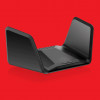How low-cost 802.11b and Linux have improved my life
Source: Newsforge.com
I was in the computer section of Circuit City, a major consumer electronics retailer, when I saw an 802.11b wireless router on sale for $89 (after $30 mail-in rebate). A salesman walked up and asked if he could help me. I asked, "Can you tell me if this works with Linux?" He said, "It sure does." This short conversation tells you just how far Linux has come in the last few years, and the router itself shows how far wireless networking has come.
I remember when coworker Jeff "Hemos" Bates (of Slashdot) started experimenting with a wireless home network. The wireless access point cost him close to $400 and the PCMCIA cards cost nearly $200 each. He had to download and compile software to run the PCMCIA cards, and was forced to use a Windows computer to set up the access point, and getting everything working took him an entire weekend.
This was two years ago.
Fast-forward to the present. You can now find 802.11b wireless cards on sale for as little as $50 -- possibly less -- with a little shopping. You can find access points for under $100. Almost every modern Linux distribution includes support for common 802.11b cards, so setting one up in your computer has become a click-click no-brainer. And yes, some of the salespeople at Circuit City and similar stores now know what Linux is and can steer you toward Linux-friendly products.
What's more, while we still grouse about hardware support for Linux, the Netgear MR314 wireless router I bought said right on the box that it would work with Linux and Unix. If I had not bought it on impulse, but had gone to Netgear's Web site for help in picking equipment, I would have found that their product selector page included Linux as one of the operating system options.









































































